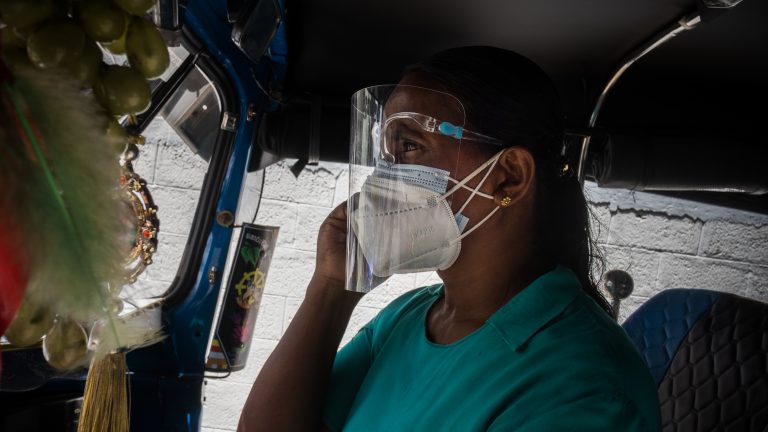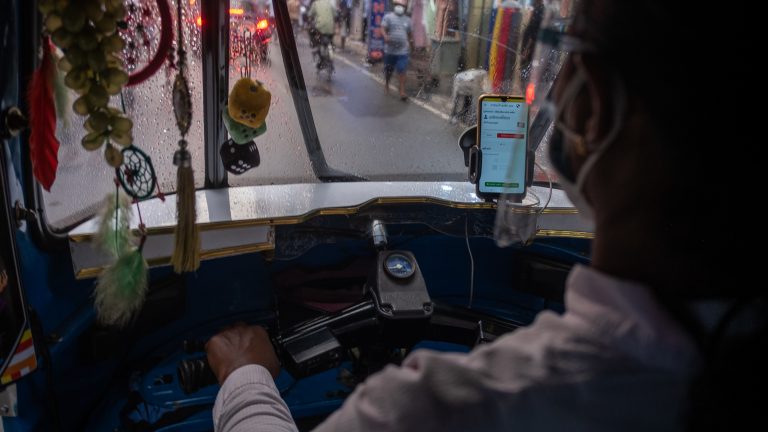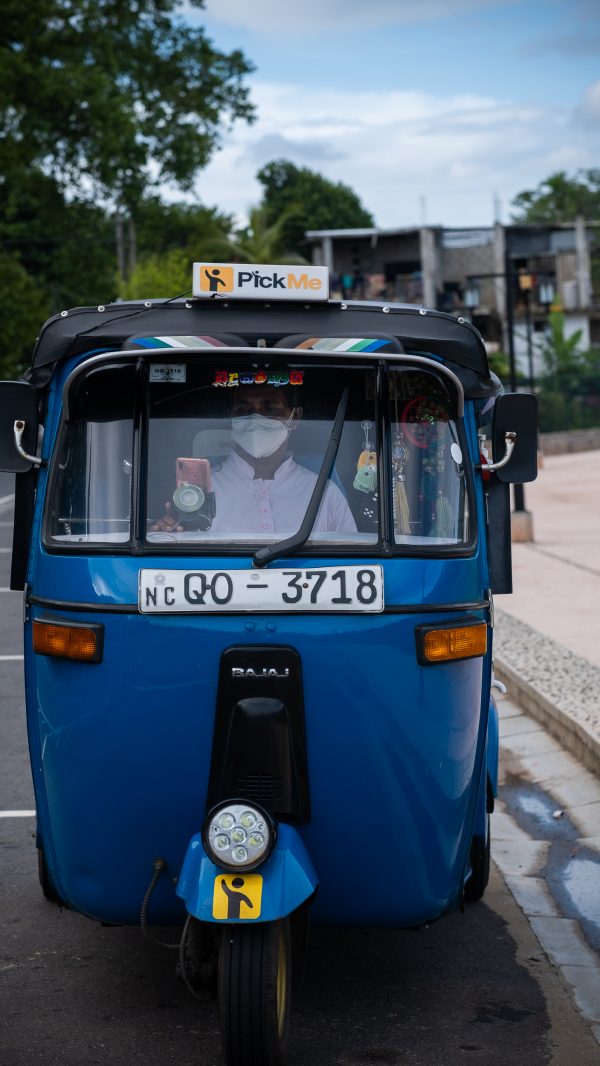What it’s like being a woman tuk-tuk driver in Sri Lanka
Posted on September 21st, 2021
As told to ZINARA RATHNAYAKE Courtesy Rest of World

Nangahami Premawathi is a 61-year-old single mother of three school-age children. She has been driving a tuk-tuk for PickMe, a Sri Lankan ride-hailing app, and for Uber, for four years. She also delivers food and packages.
In 2019, the latest year for which data is available, only 17,368 Sri Lankan women worked in the transportation and storage sector, compared to 497,102 men. Driving a vehicle, especially a tuk-tuk, is considered a man’s job.” In a 2019 study, 28% of the respondents said that families don’t allow women to drive; 21% thought being a driver wasn’t a suitable job for women; and 69% believed that it was unsafe for women to drive. But since PickMe and Uber entered the market in 2015, more women like Premawathi are driving tuk-tuks.
(Note: $1 is approximately 199.50 rupees.)
Today is Sunday, so I start my day at around 9 a.m. I usually start at 6:30 a.m. and work until 9 p.m. My target is to make 4,000 rupees [about $20] a day, but on weekends, I usually fall behind and end up with just 2,000 to 3,000 rupees. Covid-19 is out of control, so people are staying home. On working days, business is better. People are reluctant to use public transport.
I was scared about the virus too, but I recently got both doses of the Sinopharm vaccine, so I don’t think about it now.
The PickMe app generates trip requests. It takes about five seconds to see the pickup location and where I have to go. In my first year, drivers could see how much a job would pay in advance, but now you only find out the fare at the end of a trip. This morning, I accepted two trips. First, I picked up a customer near my home in Seeduwa, which is north of Colombo, and took them 26 kilometers to Modara, on the edge of the city. Then, I got another trip to Kollupitiya, in the center of town. I like coming to Colombo. I don’t get many trips in Seeduwa, so once I see a trip to Colombo, I immediately accept it and drive around Colombo before I go home.
By 11:20 a.m., I’ve made 1,500 rupees. I get another request to pick up a young couple from Carmel Road, five minutes away, and to drive them another 12 minutes to Maya Avenue. Once I’ve set them down, I get a parcel delivery order. It’s a short ride, about 1 kilometer, which I decline. Sometimes, I don’t accept short trips or deliveries because I will have to ride for 1 kilometer to pick someone up, and their trip is only half a kilometer. That’s a loss for me! PickMe drivers have a choice of which requests we accept, but there’s a cost to it. The more I decline, the lower my rating becomes. We don’t know by how much. About two weeks ago, my rating dropped to 4.72. When I called PickMe, they didn’t tell me why.


I can cancel up to two trips per day. If I cancel more than that, my rating goes down. The lower your rating is, the longer it takes for a request to show up. My rating is now 4.79 out of five. If you are rated lower than 4.5, you don’t get many long-distance trips, which means you make less money. So I have to be careful when I decline requests or cancel a trip.
After declining the delivery order, it takes five minutes for my next request to show up. I pick up a middle-aged man at Nugegoda, right in the middle of the city, to take him to Ratmalana, near the airport. He’s chatty. I like customers who chitchat. It keeps my spirits up, and I forget that the June sun is burning me. We drive past the Maliban biscuit factory in Ratmalana, and I get the smell of freshly baked biscuits. This is when I think of lunch. Earlier, I would bring a packet of rice and curry from home or snack on two deep-fried potato and fish rolls for lunch. After eating, I used a public washroom. But now, Covid-19 has made it risky to use public toilets, so I skip lunch. I’m used to hunger now. I try not to think about it.
As a woman driver, I feel safer with both PickMe and Uber. If a customer behaves inappropriately, I can complain.”
It’s a 20-minute ride. My customer asks me why Uber drivers don’t accept credit or debit card payments. I tell him it’s because Uber takes one week to transfer money. PickMe is better in that way because we get money at the end of the day. This customer is very understanding; he says he won’t pay by card again. I often meet nice customers. Some of them invite me home for tea. Some of them tip me generously. Many female customers note down my phone number and call me for their trips; they feel safer with a woman driver. I sometimes meet angry customers who are unhappy with my service; they enter the wrong location and blame me for being one minute late. But the good ones make up for it; they keep me going.
I get a new request, and I have to drive back to Dehiwala. It’s a short trip with two stops, but I can’t take a risk of canceling it. It’s half past 12 now, the sun is harsh, and I’m tired. My leg pain kicks in now and then. It was worse when I was operating a sewing machine at home. I was making clothes and school bags that I sold to shops. But my legs started to swell, so I started driving the tuk-tuk.
Before joining PickMe, I picked up random customers on the road. It’s rare to see women tuk-tuk drivers in Sri Lanka, so I used to face harassment from male drivers and male customers; they mocked me for driving a tuk-tuk or asked me for sexual services. Sometimes, random men and women hailed me for a ride and told me to join a brothel because the money, they said, was better. As a woman driver, I feel safer with both PickMe and Uber. If a customer behaves inappropriately, I can complain.
It’s 1 p.m., and I drop a young girl home in Wellawatte. She was happy to see a woman driver and saved my number for future trips. I’ve completed seven trips in the first half of the day and made 2,470 rupees. I have to give PickMe a 25% commission on fares and a 25-rupee fee on every trip. Petrol prices went up in June, but our rates for one kilometer are still the same. So after I take out fuel charges, I only have about 1,800 rupees [about $9] left over. I need a few more long-distance trips if I’m going to be able to go home early to see my children.Zinara Rathnayake is an independent journalist based in Colombo, Sri Lanka, and Guwahati, India.